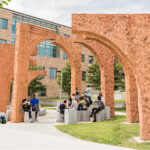
As travel has come to a standstill for many students worldwide, it’s never been quite so crucial to have someone like Adwoa Hanson-Hall on the job. In her work as an international student advisor for the Office of International Education Services (IES), Hanson-Hall knows first-hand how important it can be to have someone who knows the ins-and-outs of immigration and international travel on your side.
 Headshot provided by Hanson-Hall.
Headshot provided by Hanson-Hall.UMBC Magazine: What is your favorite thing about the work you do at UMBC, and why?
Adwoa Hanson-Hall: Advising international students often consists of addressing non-immigration concerns like culture shock, interpersonal relationships, and more. I immigrated to the U.S. as a child and have also studied and lived outside the U.S. before my time at UMBC. I really enjoy being able to connect with students through shared experiences to help them navigate any frustrations related to adjusting to and studying in a new culture.
UMBC Magazine: Can you tell us a little bit about the work you do in the International Education Services office?
Hanson-Hall: Of course! I work mainly with new and current international students at UMBC. This includes immigration advising related to F-1 visa requirements, general support for our international student population regarding cultural adjustment, and outreach to newly admitted international students who are still abroad. I also coordinate our You Are Welcome Here (#YAWH) Scholarship program.
UMBC Magazine: Why do you feel that service is so important, especially now?
Hanson-Hall: As I mentioned above, moving to a new country can be very jarring. Additionally, adjusting to an academically rigorous university like UMBC while navigating cultural nuances has its challenges. Our work mitigates the stress related to following immigration rules and provides support services so our students can focus on thriving academically and personally while engaging meaningfully as part of the UMBC community. In the current climate, this support is even more necessary. Our students are juggling academic and personal responsibilities, COVID-19-related anxiety as well as increased unpredictability regarding the state of immigration rules.
For example, a recent proposal by the Department of Homeland Security would mean a dramatic shift in the length of time a student can remain in the U.S. to complete their academic program. This is on the heels of another proposal that was struck down in July which would have barred international students from attending classes virtually and jeopardize their immigration status if their schools decided to switch to a remote learning model during COVID-19. In addition to our day-to-day advising, the outreach and education efforts of the IES office has been instrumental in keeping our students informed of their rights and responsibilities and planning next steps that impact their academic and career goals.
UMBC Magazine: What are you missing most about the office during the pandemic?
Hanson-Hall: That’s a tough one. I usually rode UMBC Transit to and from work—it was a nice time to relax or chat with other members of the UMBC community. That was also my unofficial way of keeping up with what was happening on campus outside of my work area so I do miss that a lot.
UMBC Magazine: Who would you want to thank for making a difference in your life at UMBC?
Hanson-Hall: My team! I’m thankful to have people that share my passion and commitment to our work and who also encourage me to explore professional goals and interests without sacrificing my personal life.
UMBC Magazine: What else would you like people to know about your work?
Hanson-Hall: I mentioned earlier that over the past six months international students are facing some uncertainty. In the midst of all these changes, UMBC has really rallied to support international students in our community. From President Hrabowski and the University leadership, to colleagues at the graduate and undergraduate levels, individual professors, and student organizations like the SGA and GSA, each facet of our UMBC community has shown care and concern in some way. It’s been encouraging to see this level of support from all facets of the campus community especially considering everyone is adjusting to new work and study structures during COVID-19. Thank you everyone!
*****
Header image of The Forum in 2018 by Marlayna Demond ’11.





